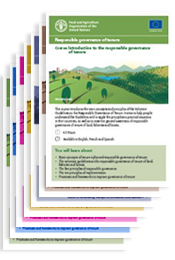Governance of tenure newsletter - July 2024
The “Voluntary Guidelines on the Responsible Governance of Tenure of Land, Fisheries and Forests in the Context of National Food Security” are referred to as the “Voluntary Guidelines" or the VGGT in this newsletter.
- The World Bank’s Land Conference - new format for improved engagement on land
- Global Land Governance and Policy forum
- Protecting Tenure Rights: Lessons from Land, Forest, and Fisheries to Reconcile Legal and Customary Laws in the Water Sector
- FAO and Partners call for more coordinated support to Inclusive Land Reforms
- UNCCD and FAO working together, securing tenure to restore land
- Mauritania | The national multi-stakeholder platform validates its action plan on women and youth
- Land tenure in Asia and the Pacific: a new series of briefing notes
- Publications and more
- E-Learning
The World Bank’s Land Conference - new format for improved engagement on land
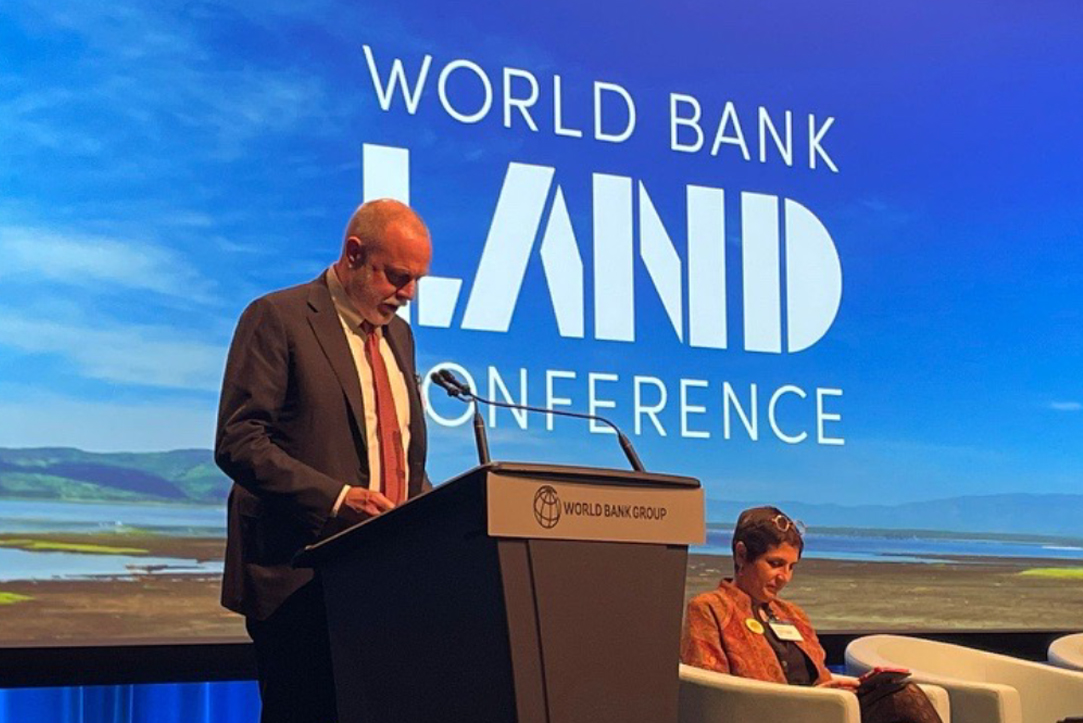
© FAO/Ward Anseeuw
After several years of interruption related to the COVID pandemic, the World Bank’s land conference was relaunched and took place on May 13-17, 2024, in Washington. Most importantly was its renewed format: from a more academic, research methodology and evidence-oriented conference, it now focused more on policy dialogue and practitioners. The research track was continued, although much smaller and running alongside the main event.
The new format was very much appreciated. The smaller audience (with about 1 000 participants, without counting those online) and the policy and practitioner focus facilitated and advanced the so needed policy dialogues and multi-stakeholder collaborations. The participation of 28 ministerial delegations, most of which stayed the entire week, is illustrative of this.
Besides this impressive mobilization and presence, three are the highlights worth to be mentioned. The first one was the Global Land Governance and Policy Forum held on the first day. Organized by a broad consortium of actors in the framework of the Global Land Agenda (GLA), under the lead of FAO, the Foreign, Commonwealth and Development Office of the United Kingdom (FCDO) and the International Land Coalition (ILC), it drew the attention of the need for a multi-stakeholder forum at global level to strengthen the land agenda globally.
Not only did the ten Ministers and Ministerial representations champion the land debate, showing the world their engagement on land and land reform processes they are engaged in, it was also the opportunity for them to share with their peers best practices and innovations. Secondly, several sessions focused on, highlighted the need for and discussed about strategic partnerships for development. They emphasized that progress on land governance and tenure security requires a reinforced, broader and better coordinated approach to change for and from within the land sector, implemented hand-in-hand with global action on economic recovery, climate change, biodiversity and open societies. Various sessions highlighted this particular necessity and showed examples of such collaborative approaches, through strategic partnerships at national level (see FAO-led session in details hereunder), at thematic level (for example on data, as illustrated by the data collaboration promoted by the European Commissions, gathering ILC, Land Portal, PRIndex, and Land Matrix), or even at cross-sectoral level (as shown by the land and water dialogues and the land tenure and desertification discussions, also presented later).
Thirdly, the policy and practitioner focus strengthened significantly country engagement. Not only did this result in the above-mentioned numerous country and Ministerial representations, it also led these representations to show engagement and lead the discussions. The regional sessions of the last day of the conference, with country level presentations, showed interest, engagement and increased action towards land reform at national level. It also showed the need for such a platform where countries can exchange, from a political as well as from an expertise and experience perspective.
The theme of the Conference was "Securing Land Tenure and Access for Climate Action." While land tenure and governance underpin climate change adaptation and mitigation, their foundational role is often overlooked. Insecure or unregistered land tenure as well as poor land governance — including unclear or overlapping laws and institutions for administering land rights and managing land use trade-offs — limits land access and security for mitigation, adaptation, and disaster risk management. These trade-offs will only become more complex to manage over time, since land resources are expected to become scarcer as urbanization accelerates and climate impacts become more severe.
The choice of setting climate as the central theme of the conference emphasizes once again the need for a reinforced, broader and better coordinated approach to change, that reaches beyond the land sector alone. Cross-sectoral strategic partnerships bringing together land, climate and nature (beyond others) will be necessary. The climate theme also promoted the presence of Indigenous Peoples and their representatives and allowed to showcase the stewardship role that Indigenous Peoples, local communities as well as collective land rights play for climate action, and a more sustainable planet overall.
It was a well-valued conference. The only regret was the separation of the main conference from the research track. A better integration of both tracks would strengthen evidence-driven policy-making processes and the incorporation of knowledge and innovative research with emerging best practices and. Overall, after 4 years, seeing again all the parties involved (some old as well as many new ones), all pushing for more engagement on land, was very much appreciated and cherished by all. Looking forward to next year’s conference!
Global Land Governance and Policy forum
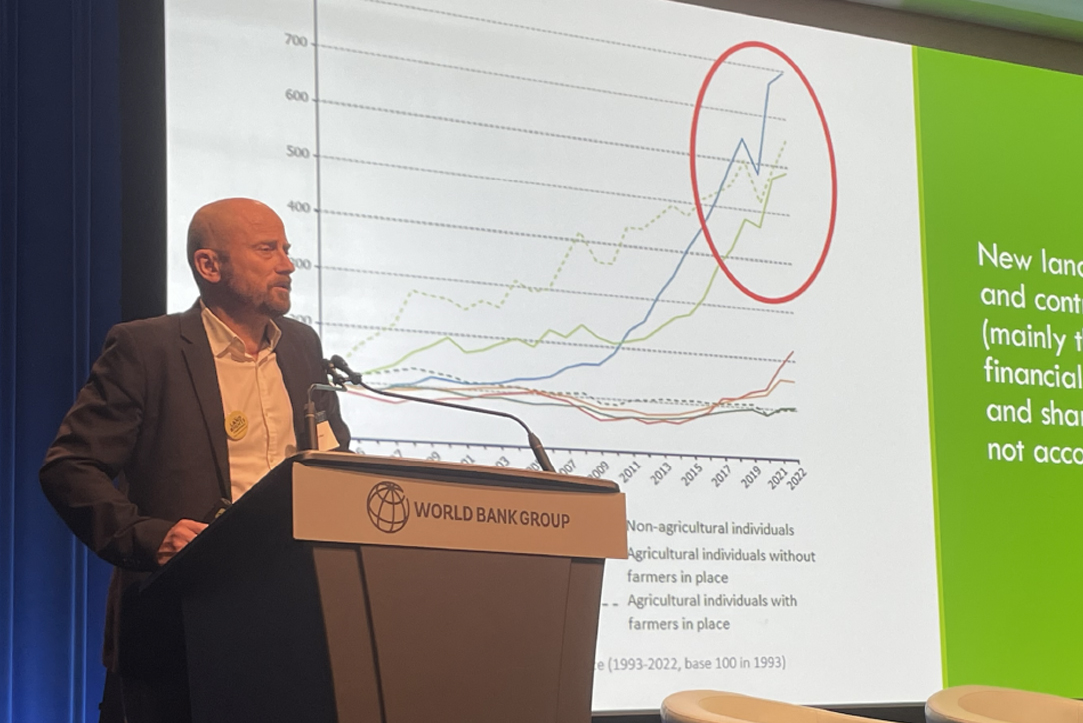
© FAO/Benjamin Davis
The first Global Land Governance and Policy (GLGP) Forum took place within the annual World Bank Land Conference in Washington D.C. on May 13, 2024. The Forum aimed to raise ambition on the required policy action and investment needed to achieve SDG 1.4 (on land tenure) by setting out the latest evidence on the case for tenure reform at scale; to further drive action by providing a platform for global champions to showcase their progress and influence others, and by setting out credible pathways to scale action.
During the discussions, stakeholders also identified strategic occasions in the coming year where the importance of land governance and tenure security can be promoted, particularly events where land governance is not strongly on the agenda, but where there is a clear interaction between land and other development themes such as climate change, biodiversity loss, land degradation, food security, conflict, among others.
This high-level Forum was attended by over 300 people. Panellists and speakers included ministers from Sierra Leone, Colombia, Indonesia, Georgia, Cape Verde, as well as senior officials from think-tanks, academia, NGOs, CSO’s and other partners in the land sector.
Key take aways:
- Need for a coordinated and integrated multi-sector approach – global, regional and local level.
- At national/local level, more political will and commitment to national reforms and their implementation is necessary, and, at the regional/global level, coordinated actions and sharing of experiences must be enhanced.
- There is an evident gap between land policy progress and actions on the ground to securing land rights.
- Multi-stakeholder platforms are important to put people and communities at the center of land reforms and have those voices reflected at the supra levels.
- State planning with local communities, respecting Free Prior and Informed Consent (FPIC) is core to ensuring ownership and land rights.
- Climate-related targets are achievable only when securing and investing in land.
Another important result was to catalyze multi-stakeholder partnerships and policy initiatives and advance the Global Land Agenda (GLA). The GLA is an informal space created by a variety of stakeholders from different organizations and institutions from the public, non-profit and private sector. These partner organizations and country government champions are driven by the existing reliable data that confirms the requisite of tenure security as the basis for sustainable development, addressing inequality and exclusion, promoting peace, a better environment, respect for human rights, food security and nutrition.
GLA’s mission is to bring together diverse actors and stakeholders to raise ambition and articulate a compelling case for global attention, investment and action on tenure security and good land governance; and collaborate to make this case resonate across a wide range of global processes in order to mobilize new policy and reform commitments from all countries, track progress and hold leaders accountable.
Global actors, especially those with capacity to finance and influence reforms, need to align their actions and step up their commitment to tenure security. There is a need to better work and coordinate together, but also to build a stronger voice and push for land tenure security as a basis for resilient, sustainable and inclusive societies.
Protecting Tenure Rights: Lessons from Land, Forest, and Fisheries to Reconcile Legal and Customary Laws in the Water Sector
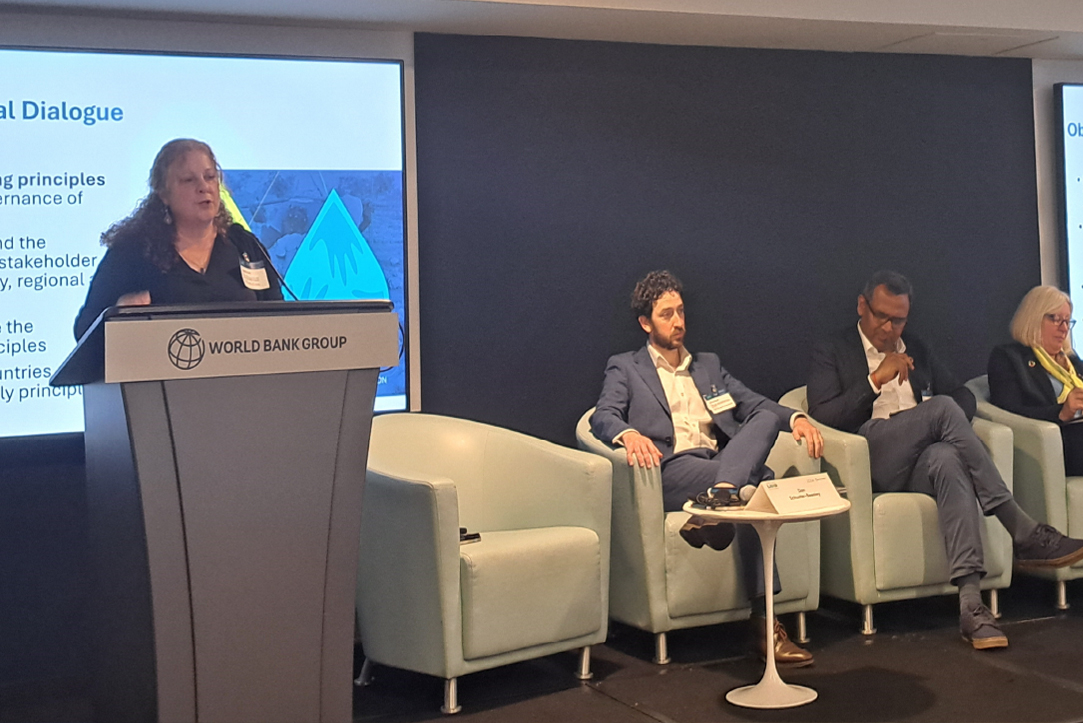
© FAO/Sofia Espinosa
Globally, over 2 billion people lack access to safe drinking water, and nearly 4 billion experience severe water scarcity for at least one month a year. Despite the critical importance of water for life and livelihoods, it is often not the lack of water availability but its misuse and inequitable distribution that hinders access. On May 15, 2024, the Conference, hosted a thematic session titled "Protecting tenure rights: lessons from land, forest, and fisheries to reconcile legal and customary laws in the water sector" that provided important indications on how to face these challenges.
The event, chaired by Environmental Law Institute (ELI), Rights and Resources Initiative (RRI), and FAO, was part of the Global Dialogue on Water Tenure, focusing on the protection of water tenure rights and their integration into initiatives addressing land rights, inequality, and climate change. The session emphasized the necessity for collective action and multi-stakeholder collaboration to achieve sustainable and equitable water governance, aligning with broader global development goals. It brought together experts, policymakers, and stakeholders from various sectors and regions to discuss the significance of water tenure in sustainable development.
Ward Anseeuw, Senior Land Tenure Officer at the FAO, opened the session with welcoming remarks and an overview of the current landscape of tenure rights. He highlighted the need for an integrated approach to secure land and water resources, setting the stage for subsequent discussions on the complexities of water tenure.
Sofia Espinosa, a Land and Water Tenure Specialist at the FAO, presented on the evolution of Voluntary guidelines on land, forests, and fisheries (VGGT) and their impact on global tenure frameworks, emphasizing the importance of extending these principles to water tenure to promote inclusive governance.
Core of the session was a panel discussion on "Water tenure approaches at work to improve access to water for smallholders, women, marginalized groups, and ecosystems" offering diverse perspectives on enhancing access and sustainability through water tenure approaches. Astrid Jakobs de Padua, Minister Counselor for Food and Agriculture at the German Embassy in Washington, discussed the long political process for adopting the VGGT and their relevance in realizing human rights to food and water.
Local representatives and community members from Zambia contributed significantly by sharing video testimonies on how water tenure perspectives at the community level safeguard legitimate water uses and promote sustainable livelihoods. Their insights provided a grassroots view of the practical implications of water tenure governance.
Srinivasa Srigiri, Senior Researcher at the German Institute for Development and Sustainability, highlighted the importance of analyzing water tenure arrangements for ecosystem sustainability. He explained how assessing water tenure can help evaluate the benefits and risks of investments in water infrastructure, demonstrating the interconnectedness of water resources and ecosystem health.
Dan Schuster Beesley, Deputy Team Leader for Sustainable Water and Food Systems at the UK Foreign, Commonwealth & Development Office, emphasized the role of water tenure in facilitating multi-stakeholder agreements for responsible water governance. He stressed the need for collaboration among various stakeholders to address water-related challenges effectively, including integrating water debates into broader natural resource discussions to ensure equitable development.
Following the panel discussion, Jessica Troell and Chloe Ginsburg from tRRI outlined the goals of the global dialogue and the necessity of collective action and stakeholder engagement. They emphasized the importance of building on existing knowledge, particularly regarding the land-water correlation for rural women and pastoral communities.
The session concluded with a round of questions, where participants explored who could benefit from water guidelines and how these guidelines could shift the power landscape for rural communities. They also discussed the importance of integrating existing knowledge on land and water rights for rural women and pastoral communities. To end the session a call for action, inviting attendees to engage in the Global Dialogue on Water Tenure. She highlighted that ongoing dialogue is crucial for shaping policies and practices to protect water rights for all tenure holders. The national multi-stakeholder platform validates its action plan on women and youth.
FAO and Partners call for more coordinated support to Inclusive Land Reforms
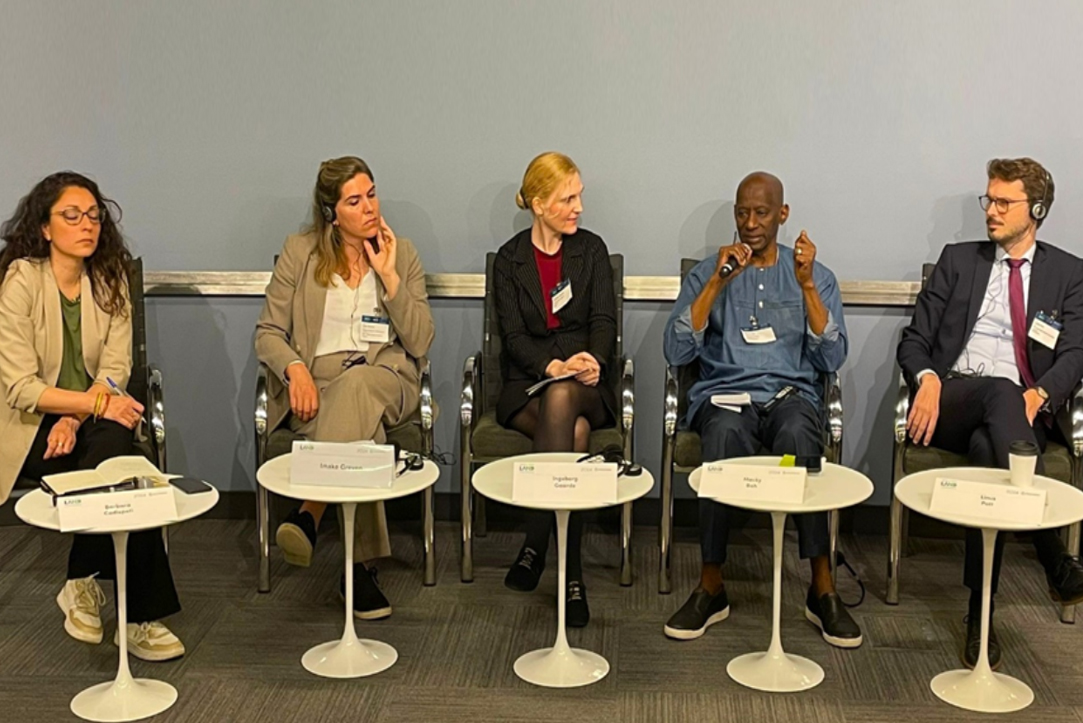
© FAO/Ward Anseeuw
Main take aways:
1. Strong coordination between developing partners around inclusive land reforms is important for sustainability and for maximizing long term impacts. It is equally important to ensure entrusted allies in the process.
2. The roles in multi-actor and multi-sector partnerships are complementary; and can change over time. Inclusive multi-stakeholders’ processes demand resources at all stages and are relatively expensive. Joint efforts are therefore considered key to success.
3. Investing in preparatory phases, including capacity-building, education and creation of national human capital resources should not be underestimated as it is critical for the feasibility and impact of the process.
On May 16, 2024, the FAO, OXFAM Novib, the Netherlands Enterprise Agency (RVO), the World Bank and other partners organized an interactive session to critically reflect on how partnerships on land reforms work in practice. The session opened with a panel discussion on how multi-stakeholder partnerships have helped to trigger inclusive land reforms, particularly for land policy formulation process. Insights from recent processes in Chad and Guinea were presented by actors actively involved. A specific accent was put on the interplay between different roles (i.e. initiators, facilitators, representative of rights holders, funders, technical experts etc.).
The case of Chad demonstrates how the preparatory phase of a land policy formulation process is critical to allow for meaningful participation of all concerned actors. Clear process-ownership recognized to the government, complementary convening and facilitating roles of supporting development partners, resources and time dedicated to extensive capacity building have been key in this process. Specific attention and similar principles were applied to the preparation of an action plan, which serves as a roadmap for the implementation of land reforms. It also shows the critical role of the ‘Land Champions’ from the Government, national civil society, and national technical experts to fostering political will and move things forward. It shows the importance of coordination among development partners, using an informal but highly coordinated task-force model of action.
The case of Guinea shows how attempts from development partners to support the land reform process only succeeded when the national civil society and other national actors convened a multi-stakeholder platform for consultation and action. The Land Policy formulation process is currently ongoing with support from FAO, French Development Agency (AFD) and UN Habitat. And it is inspired by the Voluntary Guidelines on the Responsible Governance of Tenure (VGGT) and the Framework and Guidelines on Land Policy in Africa. In Guinea, these partners have joint forces to support the land reform process though support to a multi-stakeholder platform in place in the country since 2017. The platform also played a key role in reducing the contrast between Ministries, claiming their authority on land matters.
After the success of this first consultation, four more countries (Kenya, Mexico, Senegal and Sri Lanka) will hold FAO-UNCCD supported national consultations in 2024.
Two different donor perspectives, one from Land-at-Scale program and another from the World Bank, showed programmatic tactics to foster multi-stakeholder partnerships. For Land-at-Scale, the project formulation phase embeds a deliberate strategy to coordinate with other technical and financial partners in shaping the final intervention plan. For the World Bank, illustrating the successful case of land policy reform in Sierra Leone, leveraging on the existing partnership with the government allowed to push for enactment of laws derived from the broader land policy orientation. The second part of the session allowed for the participants, rounded in groups, to critically reflect on how to better coordinate land interventions at national level. The discussion was centered on how multi-level, multi-actor partnerships can contribute to inclusive land reforms and how to better share the lessons learnt from such processes.
The participants, which included development partners, government delegations, civil society actors, private sector representatives and land practitioners agreed on the importance of making efforts to better coordinate the support to land interventions. Joint actions can help to catalyze long lasting impact through multi-stakeholder partnerships.
UNCCD and FAO working together, securing tenure to restore land
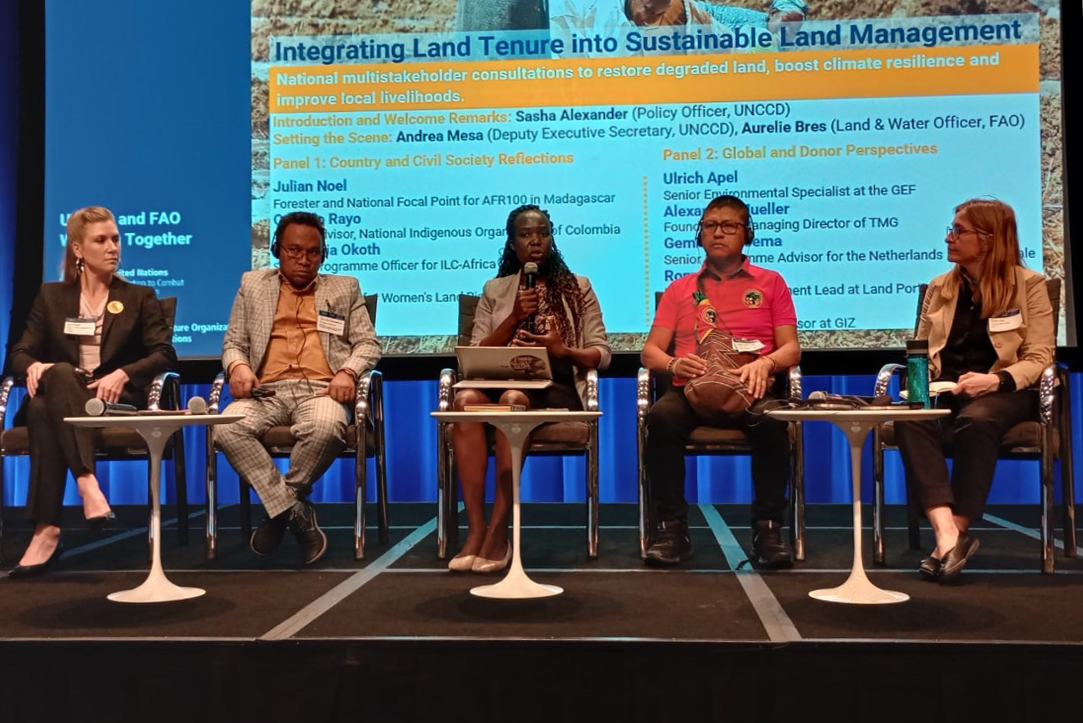
© FAO/Aurelie Bres
During the World Bank Land Conference in May 2024, the United Nations Convention to Combat Desertification (UNCCD), the FAO and multiple partners organized a plenary session on the UNCCD-FAO joint initiative which is dedicated to the integration of tenure security into sustainable land management and restoration efforts.
A landmark decision was taken by the UNCCD Parties in 2019 to integrate the Voluntary Guidelines on responsible governance of tenure on land, fisheries and forests in the context of national food security (VGGT) into the implementation of the convention and LDN has generated new momentum to improve tenure security in a variety of contexts. Since then, UNCCD and FAO produced a technical guide, [1] conducted awareness raising webinars for thousands of stakeholders worldwide, and is now planning to support over 30 countries with multi-stakeholder consultations, with a first group of five countries (Kazakhstan, Kenya, Mexico, Senegal and Sri Lanka).
Initial lessons learnt from the consultation in Kazakhstan were shared with the audience, notably on the importance of mapping relevant stakeholders and initiatives ahead of the consultation and how to create a sufficient level of knowledge on LDN, tenure and gender to ensure meaningful dialogue.
The session entitled “Integrating Land Tenure into Sustainable Land Management: National Multistakeholder Consultations” began by framing the entry points or pathways for the integration of land tenure into regenerative land management practices. Opening remarks by Sasha Alexander (Senior Policy Officer, UNCCD) and a presentation by Aurelie Bres (Land and water Officer, FAO) outlined the contours of the joint initiative on the integration of tenure considerations into land degradation neutrality (LDN) planning and implementation frameworks.[2]
Two consecutive panels were convened. The first panel benefitted of the participation of Beth Roberts (Director, Center for Women's Land Rights at Landesa); Julien Noël Rakotoarisoa (National Focal Point for AFR100 in Madagascar); Orlando Rayo (Senior Advisor, National Indigenous Organization - ONIC, Colombia); and Eva Maria Okoth (Senior Programme Officer for ILC-Africa). It focused on the reflections from countries and civil society representatives on the challenges and experiences to integrate legitimate land rights into sustainable land management, the importance of participatory land governance, and context-specific applications of the VGGT.
The second panel consisted of a range of officials from United Nations, international, and donor organizations addressing the need for policy coherence to attract financial resources and build technical and administrative capacity needs for improving tenure security. A broad range of perspectives were presented by Ulrich Apel (Senior Environmental Specialist at the Global Environmnt Facility - GEF); Alexander Mueller (Founder and Managing Director of TMG Think Tank for Sustainability); Gemma Betsema (Senior Programme Advisor for the Netherlands LAND-at-scale); Romy Sato (Knowledge Management Officer at Land Portal); and Dominik Wellmann (Land Governance Advisor at the German Agency for International Cooperation - GIZ).
The three main takeaways from the session:
- Learning and knowledge management at multiple levels are key enablers to operate at the LDN – tenure nexus that can bring together land management and land administration sectors. It is also necessary to support ecosystems restoration that integrates socio economic dimension or to allow for taking into account locally generated knowledge. Learning and knowledge management also can also improve the access to enabling data and, for donors, to review their portfolio to identify good practices and challenges.
- Systemic, continued and flexible efforts are needed to ensure meaningful multistakeholder’s dialogue in support of addressing power imbalances to advance the recognition of legitimate tenure rights, to find solution to diminish conflicts and to produce integrated land use planning with all concerned stakeholders.
- Supporting aligned efforts can happen at local, national and international levels at the same time, and mutually reinforce achieving a better integration of tenure into land restoration.
For more information: https://www.unccd.int/resources/brief/securing-tenure-restoreland-and-safeguard-livelihoods
[1] https://www.fao.org/land-water/land/tenure-ldn/technical-guide-rgt-ldn/en/
[2] https://www.fao.org/land-water/land/tenure-ldn/fao-unccd-joint-initiative/en/
Mauritania | The national multi-stakeholder platform validates its action plan on women and youth
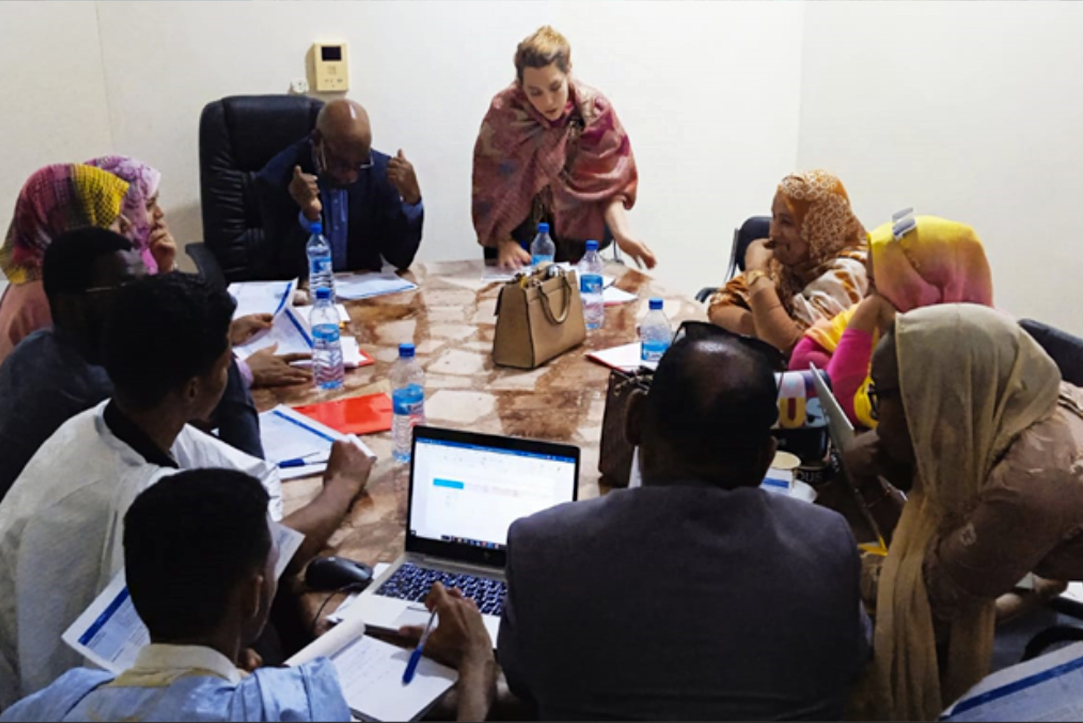
© FAO/M. Bouh
On 7 and 8 May 2024, a National Workshop of the Multi-Stakeholder Platform on Land Governance took place, with the main focus of promoting inclusiveness for better local land governance.
This workshop follows the last meeting of the platform, which was held in October 2023, the results of which are available here, which aimed to revitalize this platform, created in 2017 under the presidency of the Ministry of Economy and Finance, as part of the land reform process initiated by the Mauritanian government. The workshop was jointly chaired by the Ministry of Livestock and the Ministry of Economy and Sustainable Development, in collaboration with the Ministry of Agriculture and the Ministry of Solidarity, Social Integration and Family, which facilitated the workshop. The Organization for the Development of Arid and Semi-Arid Zones of Mauritania (ODZASAM) and the Food and Agriculture Organization of the UN (FAO) supported the organization of the workshop.
The workshop brought together about forty participants from different backgrounds: government (National Committee for the Support of the Development of Agricultural Land Heritage, Ministry of Environment and Sustainable Development), socio-professional organizations, university, civil society (National Group of Pastoral Associations, Billital Maroobé Network, World Vision, etc.), women's organizations (National Collective of Women Pastors of Africa), regional authorities (Regional Committees of the Two Hodhs), private sector (Betaclic), the United Nations coordinating agency (Office of the Resident Coordinator of the United Nations System in Mauritania), as well as technical and financial partners involved in the field of rural land tenure and agropastoral development in general (the Belgian development agency ENABEL, the German development agency GIZ, and the World Bank).
The first day was dedicated to different presentations, including the presentation of FAO's tools on the inclusive approach advocated in the Voluntary Guidelines on the Responsible Governance of Tenure of Tenure (including the Technical Guide for Equitable Land Governance for Women and Men), and the results of statistical research on women and land tenure in Mauritania. Examples of land reforms and inclusive land activities in other African countries were also presented. Partners also provided important information on the Platform for Sectoral and Multi-Stakeholder Dialogue in Agropastoralism and on the process of creating and supporting Collective Local Management Associations.
On the second day, the workshop began with a presentation by the Ministry of Economy and Sustainable Development on land reform and projects related to the inclusion of women and youth in Mauritania. The day was then devoted to group work, organized around three major themes.
First, on the theme of gender and land, the multi-stakeholder platform enriched and validated the gender analysis that was carried out in Boghé and Kaédi on the inclusiveness of women in local governance. The members of the platform proposed to i) strengthen women's leadership through life skills training, ii) remove socio-cultural obstacles through intergenerational dialogue, iii) popularize laws through community relays, iv) involve civil society to reach negotiated local agreements before advocating with the State to facilitate access to land for vulnerable people v) include more key actors by identifying organisations or structures that are familiar with the local context and (vi) engage in supporting the inclusion of youth and women in sustainable development.
Then the platform validated the actions to be carried out for its revitalization and sustainability, in particular the definition of the mandate of the land platform, the preparation of a clear roadmap, the monitoring of activities, capitalization, having a working office, and the development of a clear strategy for mobilizing resources. In terms of structure and organization, the platform proposes the establishment of a Platform Secretariat and a Technical and Monitoring Unit.
Finally, an action plan has been clearly defined until the end of 2024, to implement some of the actions of the roadmap adopted at the last workshop, starting with the development of an advocacy strategy for the land rights of women and vulnerable people.
The outcomes of this workshop are very important to ensure revitalization and cohesion within the platform, as well as to be able to implement the next steps of the action plan.
Land tenure in Asia and the Pacific: a new series of briefing notes
A set of eight briefing notes on 'Land tenure in Asia and the Pacific' have just been published. These briefing notes aim to provide:
- Technical information on the topic of land tenure;
- The context of land tenure in Asia and the Pacific region;
- Details on how land tenure is important to FAO programming and project design in the region.
The briefs use as a starting point the notion that land tenure is often flagged as a topic of great complexity and also a key safeguards issue in the work of FAO. As a result, the briefs are designed to give an entry-point to regional practitioners to learn about land tenure and how it links to a plethora of related themes.
A Brown Bag Webinar will be organized soon to present these briefs. Please keep an eye on the Governance of Tenure webpage for more information.
The series is composed by the following titles:
- Understanding land tenure
- Climate change
- Disaster risk reduction
- Forests
- Fisheries
- Agricultural productivity and food security
- Human rights
- Women’s empowerment and gender equality
- Farming the black earth: the history and politics of Ukraine’s agricultural land markets before, during and after the war
- The Unjust Climate report - Measuring the impacts of climate change on rural poor, women and youth
- Promoting inclusive land governance through multi-stakeholder platforms for successful land policy reforms
- Produire, partager et renforcer l’usage des données: défis et enseignements tirés des observatoires des grandes acquisitions foncières
- Land Administration and Geospatial Information Hard Talk: A Critical Evaluation
- Land administration and Geospatial information hard talk: Reviewing the posted comments
- After a Century of Land Consolidation in Europe – Taking Stock and Looking Forward
A wide variety of e-learning courses are available on the Responsible Governance of Tenure. Learn about:
- making access to land, fisheries and forests more equitable
- how to protect people's tenure rights
- options to simplify the administration of tenure and make it accessible to all
- how to ensure disputes are resolved before they degenerate into conflict

